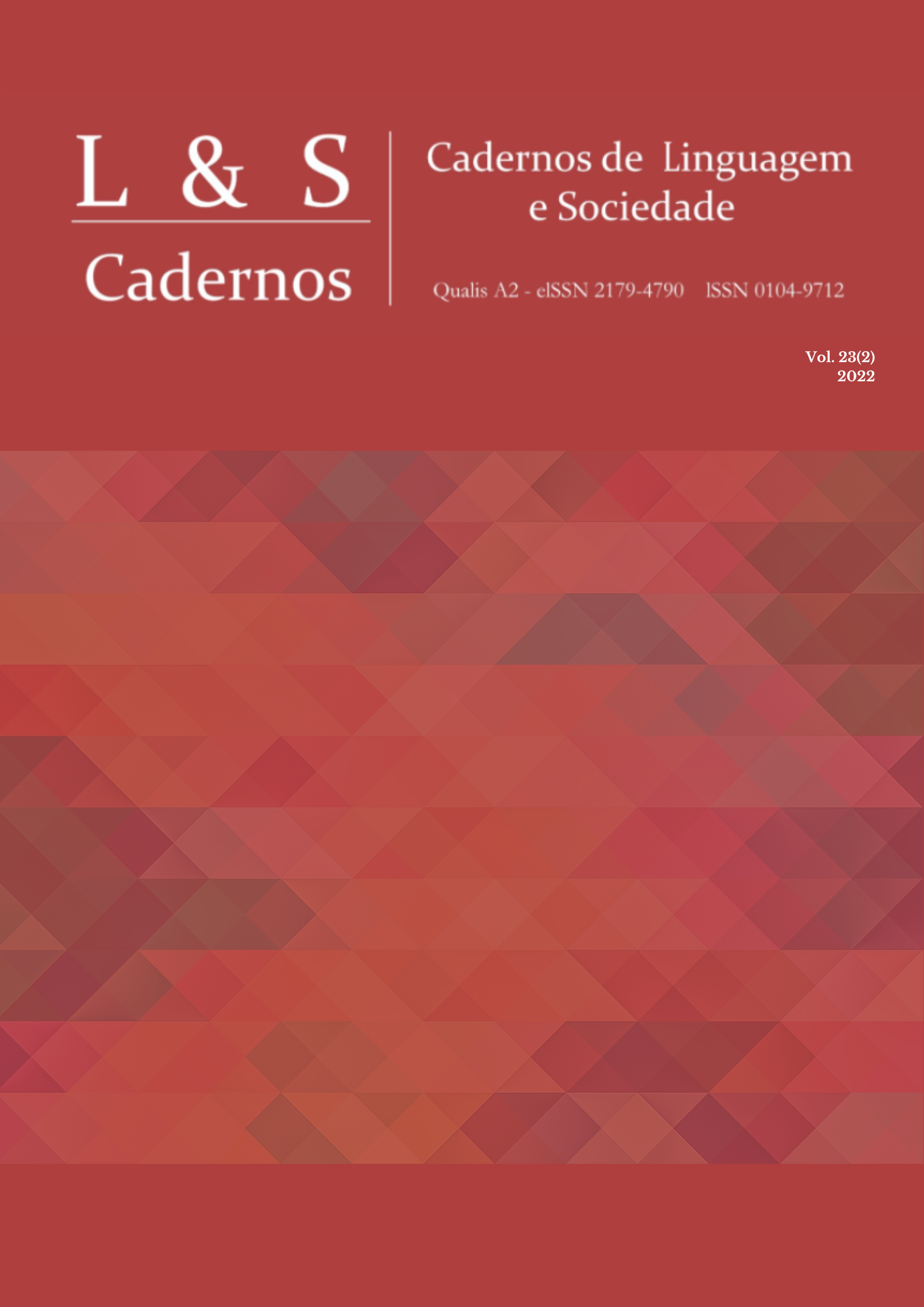The place of Mozambican Languages in the Mozambican Educational Landscape: What perspectives?
DOI:
https://doi.org/10.26512/les.v23i2.43490Keywords:
Mozambique, language politics, identities, education, transgressionAbstract
This paper analyzes how the language issue in Mozambique has been dealt with over the years and its impact on education. Legislation and other subtle mechanisms have been used to make the multilingualism of the territory invisible in school curricula, as both colonial and post-independence authorities adopted Portuguese as the language capable to create a nation-state. It is thus Mozambique is mostly guided by western epistemes, therefore a change is needed in the way educational research and science are conducted. The article is sustained in cultural and postcolonial studies (Bhabha, 1994; Cavalcanti, 1999, 2011; Hall, 1996).
Downloads
References
BAMGBOSE, A. Mother tongue education. The West African experience. London: Hodder & Stoughton/Paris: UNESCO, 1976.
BHABHA, H. K. Nation and Narration. Londres: Routledge, 1999.
BHABHA, H. K. The Other Question: The Location of Culture. Londres: Routledge, 1994.
BOURDIEU, P. The Economics of Linguistic Exchange. Social Science Information, 1977, 16.6. p. 645-668.
CAVALCANTI, M.C. Estudos sobre a Educação Bilíngüe e Escolarização em Contextos de Minorias Lingüísticas no Brasil. DELTA, v. 15, n. Especial, p. 385-471, 1999
FIRMINO, G. “Revisiting the Language Question in Post-Colonial Africa: the case of Portuguese and indigenous languages in Mozambique.” (Ph.D. thesis: University of California, Berkerly, 1995.
FIRMINO, G. et al. Relatório do 1º Seminário sobre a Padronização da Ortografia das Línguas Moçambicanas. Maputo, 1989.
GANHÃO, F. Discurso de Abertura do 1º Seminário do Ensino da Língua Portuguesa. Maputo: Ministério de Educação, 1979.
HALL, Stuart. Cultural Representations and Signifying Practices. Londres: Sage/Open University Press. 1996.
HALL, Stuart. A identidade cultural da pós-modernidade. São Paulo: DP&A, 2006.
HALL, Stuart. Quem precisa da identidade? In: SILVA, Tomaz Tadeu da (org.). Identidade e diferença: a perspectiva dos estudos culturais. Tradução de Tomaz Tadeu da Silva. Petrópolis: Vozes, 2009, p. 103-133.
HORNBERGER, N. Multilingual Language Policies and the Continua of Biliteracy: An Ecological Approach Language Policy, 2002, p. 27-51.
LOPES, A. J. A Batalha das Línguas. Perspectivas sobre Linguística Aplicada em Moçambique. Maputo: Imprensa Universitária, 2004.
MAHER, T. M. Cultura Interacional e Ensino de Línguas. Revista do Instituto de Letras, v. 17, Campinas: PUC, 1998.
MAKONI, S.; MEINHOF, U. Linguística Aplicada na África: desconstruindo a noção de língua. In:
MOITA LOPES, L. P. Por uma linguística aplicada indisciplinar. São Paulo: Parábola, 2006.
MARTINEZ, V. C. O que é o Estado? Revista Jus Navigandi, ISSN 1518-4862, Teresina, ano 18, n. 3771, 28 out. 2013. Disponível em: https://jus.com.br/artigos/25616.
MCCARTHY, T. (ed.). Ethnography and Language Policy. New York: Routledge, 2011.
MOAG, R. The Life Cycle of Non-Native English: a Case Study. In: KACHRU, B. (ed.). The Other Tongue. English Across Cultures. Oxford: Pergamon Press, 1982.
MOÇAMBIQUE. Ministério de Educação e Desenvolvimento Humano (MINEDH). Lei 18/2018 do Sistema Nacional de Educação na República de Moçambique, 2018.
MOÇAMBIQUE. Instituto Nacional de Estatística. Resultados definitivos do Censo Geral da População de 2017. Maputo, 2019.
MOÇAMBIQUE. Ministério de Educação e Desenvolvimento Humano (MINEDH). Estratégia de Expansão do Ensino Bilingue (2020-2029). Maputo, 2019.
MONDLANE, E. Lutar por Moçambique. Lisboa: Livraria da Sá da Costa Editora, 1969.
NGUNGA, A. e FAQUIR, O. (eds.). Padronização da Ortografia de Línguas Moçambicanas: Relatório do III Seminário. Maputo: Centro de Estudos Africanos, 2011.
PATEL, S. Um olhar para a formação de professores de educação bilingue em Moçambique: Foco na construção de posicionamentos a partir do lócus de enunciação e actuação. (Tese de Doutorado). Campinas: Unicamp, 2012.
PENNYCOOK, A. Critical pedagogical approaches to research. TESOL Quarterly, v. 28, p. 690-693, 1994.
PENNYCOOK, A. A Linguística Aplicada nos anos 90: Em Defesa de uma Abordagem Crítica. In: Signorini, I. & Cavalcanti, M. C. (Org.) Linguística Aplicada e Transdisciplinaridade. Campinas: Mercado de Letras, 1998, p. 23-49
KATUPHA, M. Language and Problems of Technical and Cultural Development in ‘Latin’ Africa: the Mozambican case. In: SABOUR, M. Perspectives in Development: Voices from the South. Joensuu University Press, 1994.
KELMAN, H.C. Language as an Aid and Barrier to Involvement in the National System. In: RUBIN, J.; JERNUDD, B. (ed.). Can Language be Planned? Honolulu: University Press of Hawai, 1971.
ROMAIN, S. Bilingualism. 2nd ed. Oxford: Basil Blackwell, 1995.
SILVA, T. T. Documentos de Identidade: Uma Introdução às Teorias do Currículo. 2 ed. Belo Horizonte: Autêntica, 1999.
SITOE, B.; NGUNGA A. (org.) Relatório do II Seminário sobre Padronização da Ortografia de Línguas Moçambicanas. Maputo: NELIMO, Universidade Eduardo Mondlane, 2000.
SKILIAR, C. A Pedagogia (Improvável) da Diferença: E se o Outro não Estivesse aí? Rio de Janeiro: DP&A, 2003.
SKUTNABB-KANGAS, T. Review of Linguistic Minorities in Multilingual Settings. Implications for Language Policies. RELC Journal, v. 26, p. 130-138, 1995.
THIONG’O, N. Decolonising the Mind. Zimbabwe: Publishing House,1994.
TOLLEFSON, J. W. (org.). Power and Inequality in Language Education. Cambridge: University Press, 1995.
TORP J. Mozambique. In: TORP, J.; RAY, L.M. Mozambique and São Tome e Príncipe. New York: Pinter Publishers, 1989.
UNESCO. UNESCO Position Paper: Education in a Multilingual World, 2002.
VIEIRA, S. O homem Novo é um Processo. Maputo: Tempo, 1978, 398: p. 27-38.
WOODWARD, K. Identidade e Diferença: Uma Introdução Teórica e Conceitual. In: SILVA, T. T. (org.). Identidade e Diferença: A Perspectiva dos Estudos Culturais. Petrópolis: Vozes, 2009, p. 7-72.
YAI, O. B. Elements of a Policy for Promotion of National Languages in Mozambique. Paris: UNESCO, 1983
Downloads
Published
How to Cite
Issue
Section
License
Copyright (c) 2022 Cadernos de Linguagem e Sociedade do Programa de Pós-Graduação em Linguística da UnB é licenciado sob uma Licença Creative Commons Atribuição-Uso não-comercial-Vedada a criação de obras derivadas 3.0 Unported.

This work is licensed under a Creative Commons Attribution 4.0 International License.



